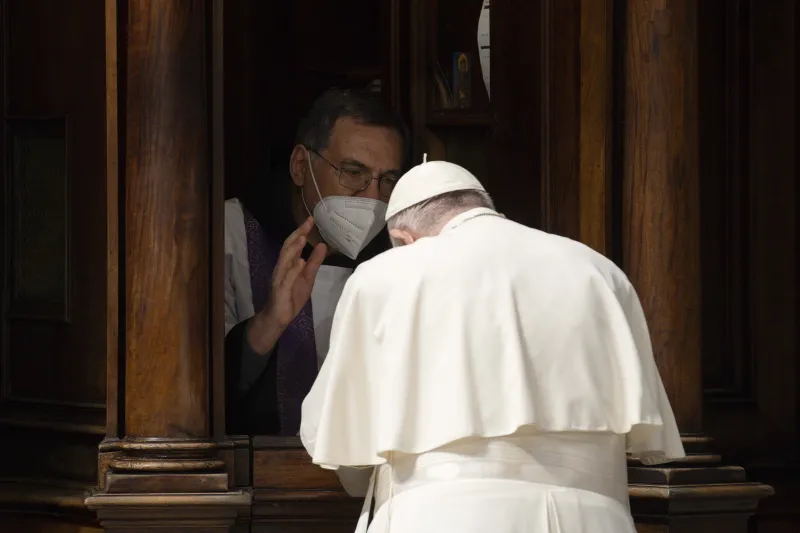
Readings:
• Acts 2:42-47
• Psa 118:2-4, 13-15, 22-24
• 1 Pet 1:3-9
• Jn 20:19-31
Fear. Then faith. Followed by fellowship.
Considered together, the readings for this second Sunday of Easter, or Divine Mercy Sunday, reveal this progression from dark to light, from confusion to communion.
This movement began in the darkness that overwhelmed the disciples following the death of Christ, is transformed by the risen Christ in their midst, and is then brought to fruition in the lived reality of common worship.
The story of doubting Thomas is well known, perhaps to the point that we take for granted how extraordinary it is. The disciples were afraid, for their lives were in shambles and their very existence precarious. Jesus had appeared to Mary Magdalene near the tomb and she later told the disciples, “I have seen the Lord” (Jn. 20:11-18). But they were in shock, uncertain of what to do except to hide behind locked doors.
Then, on the evening of Resurrection Sunday, “Jesus came and stood in their midst and said to them, ‘Peace be with you.’”
He showed them his wounded hands and side. He was not a ghost or the phantasmal creation of a desperate “community”; he was and is fully God and fully man, but now with a glorified body. Victorious over death, he gave the apostles the authority to forgive sins: “Receive the Holy Spirit. Whose sins you forgive are forgiven them, and whose sins you retain are retained.”
This is the gift of divine mercy, the invitation to life-giving communion with the Lord and his Church.
The reading from Acts of the Apostles describes the vibrant life of the Church: “They devoted themselves to the teaching of the apostles and to the communal life, to the breaking of bread and to the prayers.” This resulted from faith put into action; the disciples that were once petrified and hiding behind locked doors were now filled with the Holy Spirit, committing themselves to one another and the Lord.
A key word here is koinonia, translated as “communal life” or “fellowship”. It refers to intimate communion and selfless sharing; it is essentially covenantal in nature. And the “breaking of break” is a clear reference to the Eucharistic celebration (see Lk 22:19; 24:35), the sacrament of the new covenant. “The bread that we break,” asked St. Paul of the Corinthians, “is it not a participation in the body of Christ?” (1 Cor 10:16; cf. 1 Cor 11:24).
Faith, then, is a gift from the Lord, which is demonstrated in fellowship, centered on the word of God and the reception of the Incarnate Word in the Eucharist. Faith is not a private matter. “One who wishes to make a place for the Lord”, wrote Augustine, “should rejoice not in private joy but in the joy of all”.
Pope Benedict XVI wrote something very similar in Jesus of Nazareth: Holy Week: “The Eucharist is also a visible process of gathering. In each locality, as well as beyond all localities, it involves entering into communion with the living God, who inwardly draws people together. The Church comes into being from the Eucharist.”
It is within the Church, in the sacrament of confession, that mercy is experienced in a most tangible way, and with concrete results. The early Christians believed together “and had all things in common”, selling possessions in order to help each according to their need. In this way they put into practice the teachings of Jesus found in Luke 6: “Give to everyone who asks of you, and from the one who takes what is yours do not demand it back. … Be merciful, just as your Father is merciful” (Lk. 6:30, 36).
This divine mercy flows from the heart of the Father, revealed in the death of the Son, and given by the power of the Holy Spirit. Jesus Christ, wrote John Paul II in his encyclical Dives in Misericordia (“On the Mercy of God”) “makes incarnate and personified [mercy]. He himself, in a certain sense, is mercy.”
Those who embrace this divine mercy cast out fear, are filled with faith, and are embraced in fellowship.
(This “Opening the Word” column originally appeared in the May 1, 2011, edition of Our Sunday Visitor newspaper.)
If you value the news and views Catholic World Report provides, please consider donating to support our efforts. Your contribution will help us continue to make CWR available to all readers worldwide for free, without a subscription. Thank you for your generosity!
Click here for more information on donating to CWR. Click here to sign up for our newsletter.








Appreciate what you say about the sacrament of confession. So many have been saved from eternal disaster through that wonderful gift of God’s merciful love. Although with confession lines dwindling virtually nonexistent in some churches, when a priest makes it known in other settings that he’s prepared to reconcile there’s surprising response.
Perhaps it’s the clime we’re in, a raucous disorder, a gathering of dark clouds. Then there’s the bright blue above, a pristine day when good was done, that hope remains.